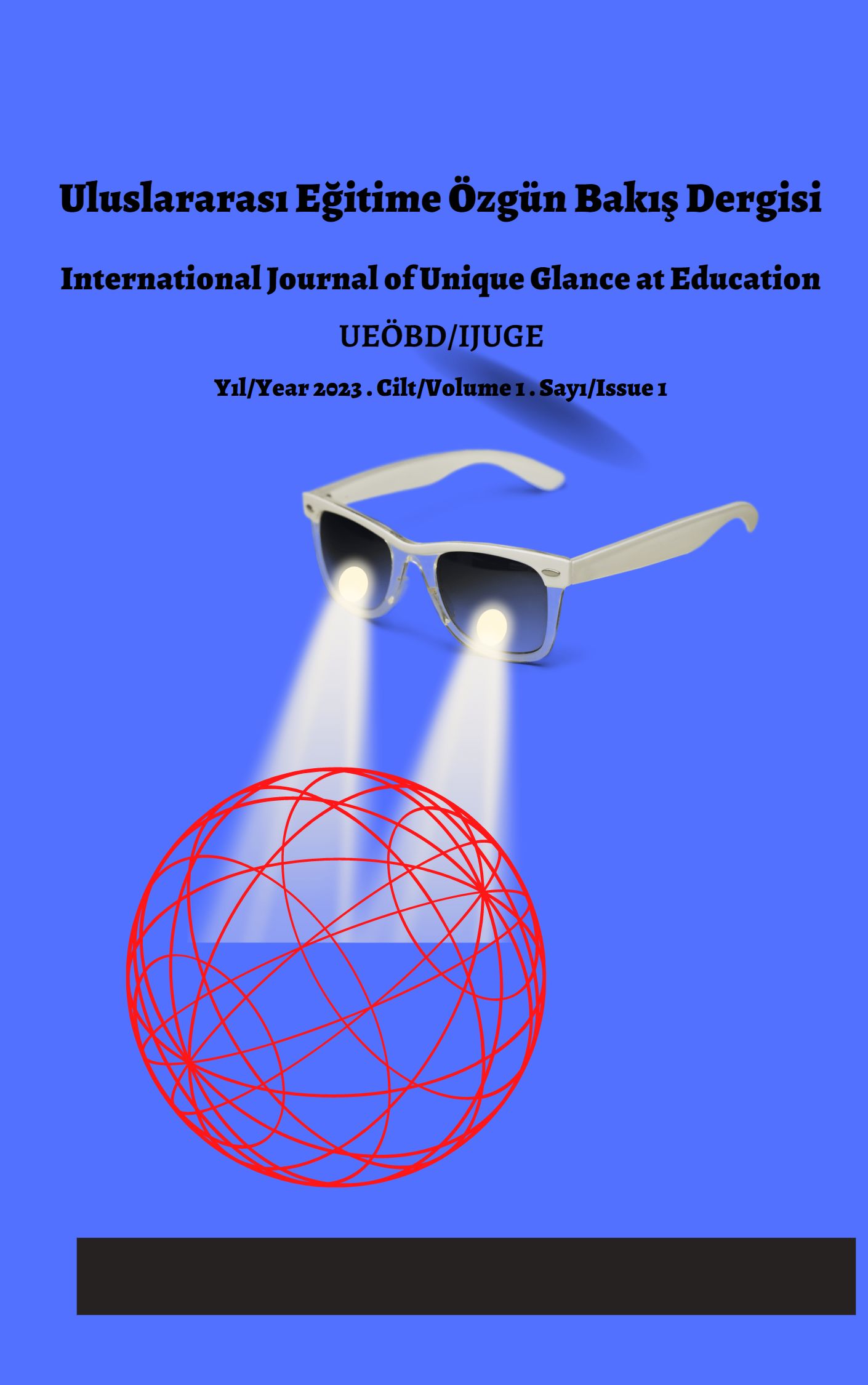Investigation of the Effects of School Gardens on Education in Terms of Various Variables
DOI:
https://doi.org/10.5281/zenodo.7502621Anahtar Kelimeler:
Okul, Okul bahçesi, Eğitim, Fiziksel yapı, Okul çevresiÖzet
This study aims to determine the physical conditions, cleanliness and order of the school gardens, the conditions of the garden walls and the security measures taken regarding the gardens, and to reveal the reflections of these features on education. In addition, this study reveals the satisfaction levels of students, parents, teachers and school administrators regarding school gardens. This study is a qualitative research in survey model. Research data were collected by natural/unstructured observation and semi-structured interview techniques. Content analysis technique was used in the analysis of the data. This study was conducted in six official primary schools at lower, middle and upper socio-economic levels, and interviews were conducted with 163 students, 95 parents, 67 teachers and 15 administrators in these schools. In the research, it was determined that the school gardens do not have the features to increase the physical activity of the students, there are insufficient and unplanned applications in the gardens, and the gardens do not contribute to the educational activities. In addition, it has been determined that students, parents, teachers and administrators are not satisfied with the physical conditions, cleanliness and order of the school gardens, the condition of the garden walls and security measures.
Referanslar
Akdoğan, G. (1972). Beş büyük şehirde çocuk oyun alanlarının yeterlikleri ve planlama prensipleri üzerinde bir araştırma. Ankara: Ankara Üniversitesi Yayınları.
Aksu, Ö.V. ve Demirel, Ö. (2011). Trabzon kenti okul bahçelerinde tasarım ve alan kullanımları. SDÜ Orman Fakültesi Dergisi, (12), 40-46.
Algan H. & Uslu, C. (2009). İlköğretim okul bahçelerinin tasarlanmasına paydaş katılımı: Adana örneği. Akdeniz Üniversitesi Ziraat Fakültesi Dergisi, 22(2), 129–140
Algan, H. (2008). İlköğretim okul bahçelerinin tasarlanmasında paydaş katılımlı yaklaşım. (Yayımlanmamış yüksek lisans tezi). Çukurova Üniversitesi, Adana
Arslan-Muhacir, E.S & Yavuz Özal, A. (2011). Determination of quality and quantity for primary schoolyards in Artvin city center by using geographical ınformation system. Artvin Çoruh Üniversitesi Orman Fakültesi Dergisi, 12(2), 172-184
Blair, D. (2009). The child in the garden: An evaluative review of the benefitsof school gardening. The Journal of Environmental Educatıon, 40(2), 15-38.
Bowker, R. & Tearle, P. (2007). Gardening as a learning environment: A study of children’s perceptions and understanding of school gardens as part of an international Project. Learning Environ Res., (10), 83–100.
Cohen, L. Manion, L. & Morrison, K. (2007). Research methods in education. London: Routledge
Çağlar, Y. (1995). Sosyal bilgiler öğretimi ve doğal çevre. İlköğretim Kurumlarında Sosyal Bilgiler Öğretimi ve Sorunları. Türk Eğitim Derneği XIII. Öğretim Toplantısı. Türk Eğitim Derneği Öğretim Dizisi.
Erdönmez, İ.M.Ö. (2007). İlköğretim okulu bahçelerinde peyzaj tasarım normlar. İstanbul Üniversitesi Orman Fakültesi Dergisi, 57(1), 107-122.
Erözeren, H. & Demirkasımoğlu, N. (2022). İlkokul bahçelerinin mevcut durumuna ve ideal okul bahçelerine ilişkin öğretmen görüşleri. Kırıkkale Üniversitesi Sosyal Bilimler Dergisi (KÜSBD), 12(1), 225-258
Gömleksiz, M., Kilimci, S., Vural, R.A., Demir, Ö., Koçoğlu-Meek, Ç. & Erdal, E. (2008). School yards under the magnifying glass: A qualitative study on violence and childrens’ rights. Elementary Education Online, 7(2), 273-287.
Görmez, K. & Göka, E. (1993). Çocuk ve çevre. İstanbul: Çocuk Vakfı Yayınları.
Jhonson, S. (2012). Reconceptualising gardening to promote inclusive education for sustainable development. International Journal of Inclusive Education, 16(5-6), 581–596.
Kansu, N. A. (2017). Pedogoji tarihi. İstanbul: Telgrafhane Yayınları
Karasar, N. (2022). Bilimsel araştırma yöntemi. Ankara: Nobel Akademik Yayıncılık
Karatekin, K. & Çetinkaya, G. (2013). Evaluation of school gardens in terms of environmental education (Manisa province sample). The Journal of International Social Research, 6(27), 307-315
Lieberman, G.A. & Hoody, L. (1998). Closing the achievement gap: Using the environment as an integrating context for learning. San Diego, California: State Education and Environment Roundtable Publishing.
Louv, R. (2012). Doğadaki son çocuk. C. Temürcü (Çev.), Ankara: Tübitak Yayınları.
Maloof, J. (2006). Experience this: The experiental approach to teaching environmental issues. Applied Environmental Education and Communication, 5(3), 193-197.
Mansuroğlu, S. & Sabancı, O. (2010). Evaluating primary schools’ gardens in terms of environmental contribution to student learning: A case study in Antalya. Journal of Food, Agriculture & Environment, 8 (2), 1097-1102
Miller, D.L., Tichota, K., & White, J. (2013). Young Children Learn Through Authentic Play in a Nature Explore Classroom. Lincoln, Neb: Dimensions Educational Research Foundation
Özdemir, A. & Çorakçı, M. (2010). Participation in the greening of schoolyards in the Ankara public school system. Scientific Research and Essays, 5(15), 2065-2077
Özdemir, A. & Yılmaz, O. (2009). İlköğretim okulları bahçelerinin çocuk gelişimi ve sağlıklı yaşam üzerine etkilerinin incelenmesi. Milli Eğitim Dergisi 181:121-130
Skelly, S.M. & Bradley, J.C. (2007). The growing phenomenon of school gardens: Measuring their variation and their affect on students' sense of responsibility and attitudes toward science and the environment. Applied Environmental Education & Communication, 6(1), 97-104.
Şişman, E.E. & Gültürk, P. (2011). A resaerch on primary schoolyards in terms of landscape planing and design: Tekirdağ. Journal of Tekirdag Agricultural Faculty, 8(3), 53-60
Tanrıverdi, F. 1987. Bahçe sanatının temel ilkeleri ve uygulama metotları. Erzurum: Atatürk Üniversitesi Yayınları.
Uzun, G. (1990). Kentsel rekreasyon alan planlaması. Adana: Çukurova Üniversitesi Ziraat Fakültesi Peyzaj Mimarlığı Bölümü Ders Kitabı No:48
Weber, M. (2018). Bürokrasi ve otorite. B. Akın (Çev.) Ankara: Adres Yayınları.
Yavuzer, H. (2018). Okul çağı çocuğu. İstanbul: Remzi Kitabevi
Yıldırım, A. & Şimşek, H. (2021). Sosyal bilimlerde nitel araştırma yöntemleri. Ankara: Seçkin Yayınları

Yayınlanmış
Nasıl Atıf Yapılır
Sayı
Bölüm
Lisans
Telif Hakkı (c) 2023 Uluslararası Eğitime Özgün Bakış Dergisi

Bu çalışma Creative Commons Attribution 4.0 International License ile lisanslanmıştır.

